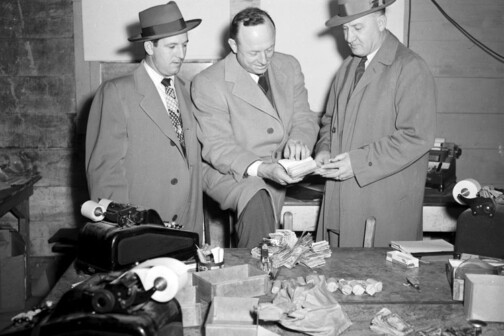#1—You’ve Got to Know When to Run
I have a special place in my heart for Kenny Rogers’ song “The Gambler,” due to a memorable client experience from many years ago. Our client was trying to acquire a major competitor. At the target company’s invitation, we traveled to meet in the offices of its lawyers.
The meeting did not go as expected. Not too long after it got started, the lawyers for the company started asking my client about his conduct involving the business operations of the target company. Based on their line of questions, it sounded to me that they had a beef with my client for interfering with the target company’s business. That was further confirmed a little later, when the target company’s lawyers indicated that they were litigators and not merger and acquisition lawyers like me. That is when it became clear that they were trying to figure out what claims the target company had against my client. So I then hurriedly suggested that we break into two separate groups for lunch so that each group could go over what we had discussed in the morning.
As soon as they left the conference room, I told my client, “Pack up your stuff right now! We need to get out of here. This meeting is not about them selling their company to you. It is about them suing you right here in their backyard for tortious interference with their business. I bet that if we stick around here much longer, a deputy sheriff is likely to walk in and serve you with a lawsuit.”
He got the message. We quietly ducked out of the conference room and ran down several flights of stairs to the street, where we hailed a cab and headed straightaway to the airport. We were safely back in Dallas in just a few hours.
The takeaway from this story is mirrored in the familiar lyrics of “The Gambler”: “You’ve got to know when to hold ’em, know when to fold ’em, know when to walk away, and know when to run.”
#2—Leave Them Laughing
A little humor can make all the difference in many negotiations. Not too many years ago, I was up against a rather strong-willed Wall Street lawyer in negotiating a merger agreement. From the very start, our negotiations did not go well. By the end of the first day, we had been unable to reach agreement on any of the major deal points. To be sure, we were both very frustrated with each other. Moreover, the tension was making it very difficult to proceed.
The next day an idea popped into my mind as we sat down to go at it again. Sitting directly in front of me at the bargaining table was a large bowl of the huge rubber bands used to put around massive-size documents. As my counterpart looked down for a moment at his notes, I took one of the rubber bands and put it around my forehead. When he looked back up, he saw the rubber band around my forehead and said nothing. Instead, he continued to give me his drafting comments on the document. Over the next 15 minutes or so, I would periodically add or take away rubber bands from my head. Finally, he could no longer try to ignore my actions, so he inquired about why I was putting on and taking off rubber bands.
I replied, “We’ve been negotiating now for more than a day with little progress to show for it. I have finally figured out what the problem is. You are apparently a visual learner, not an auditory learner. That explains why you have been unable to grasp my oral explanations for why my client’s negotiating positions are very reasonable and yours are not.
“To overcome that shortcoming, I have decided I will put a rubber band on my head each time you take an unreasonable position on an issue. I will take off a rubber band whenever you take a rational position on a matter. In that way, you will be able to visually see how well you’re doing as a negotiator. All you have to do is count the number of rubber bands on my head to see how you are doing for your client.”
He sat there silently for about a minute with a very puzzled expression on his face. He did not know whether to be mad at me or to grin and laugh. He said, “OK, let’s see if we make progress with such a process.” We continued in this way for the next two days.
My rubber band antics broke the tension and we got the deal done. Thanks to a little humor.
#3—Know All the Facts Before Starting the Negotiations
“Preparation, preparation, preparation” is an imperative before you ever sit down at the bargaining table. The first goal of an experienced negotiator is to learn and fully understand all of the material facts, including the strengths, weaknesses, objectives, and priorities of each party. With this type of information, appropriate negotiating strategies and plans can be formulated. To be sure, planning how to present a key negotiating position requires plenty of creative thought and attention to detail. A negotiator must come to the bargaining table with confidence and a quick mind.
#4—Never Negotiate Deal Terms on a Piecemeal Basis
It can be perilous to negotiate an agreement on a point-by-point basis. That is why it is so important to get the opposing party to lay out as early as possible all of its major deal points. With that accomplished, a negotiator can rank the importance of the different deal points as well as determine how and when they should be discussed and bargained over.
#5—Never Negotiate Against Yourself
A common negotiating mistake is to inadvertently negotiate against yourself. A typical illustration of this is when you put a proposal on the table. Then, before the opposing party can react to your proposal, you gratuitously revise its terms. An effective negotiator understands the importance of patience. Standing your ground until the opposing party has appropriately made a counteroffer is a basic rule of negotiations.
#6—Never Shoot From the Hip
Bluffing is a high-risk proposition in most negotiations. Never threaten the opposing party with actions if you do not have the ability to execute on them. It is prudent to have a reasonable rationale for your position. If you take a hard-line negotiating position on a matter, first make sure you have the facts in hand.
#7—Never Think You Are the Smartest Person at the Negotiating Table
Enough said.
Legendary lawyer Mike Boone is a co-founder of the firm Haynes and Boone, which represents D Magazine.






